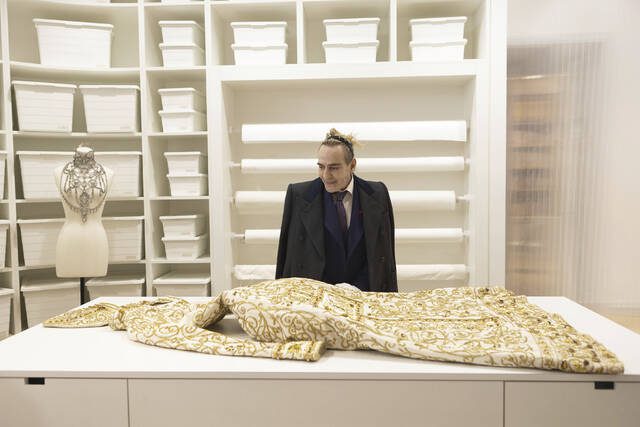NEW YORK — The new movie “High & Low — John Galliano” explores all the intricacies of the famous British designer who is considered one of the most celebrated and controversial figures in the fashion industry.
The documentary, directed by Kevin Macdonald, includes honest interviews with Galliano and fashion legends Anna Wintour, Naomi Campbell, Penelope Cruz, Kate Moss, and Charlize Theron.
Galliano found success when Givenchy appointed him as a young head designer in 1995, and later Christian Dior hired him as creative director in 1996. Throughout nearly 15 years, he devoted himself to creating numerous seasonal collections at Dior and also launched his own label. His extravagant runway shows conveyed stories through elaborate sets and makeup.
The documentary suggests that Galliano was overwhelmed and using alcohol and drugs when he made a series of antisemitic and racist remarks in 2010 and 2011. After a video of him saying “I love Hitler” went viral, there was swift outrage. Dior dismissed him, he was convicted in an antisemitism trial in France, and he withdrew from the fashion world for several years. During that time, he made public and private efforts to recover and get sober, as well as educate himself about Jewish history and culture.
In 2014, Galliano was hired by Paris fashion house Maison Margiela and presented his first show in years. His most recent show received excellent reviews. The Associated Press spoke to Macdonald about Galliano’s rise and fall and why many friends and fans remained loyal to him. Answers have been edited for clarity and brevity.
AP: How did this movie come about?
MACDONALD: I went to Paris, I met (Galliano), we had lunch, and it was clear that he wanted to make a movie. It was on his mind for various reasons, maybe in part because he thought, “Alexander McQueen has a great movie. I should have one about me.” … But also because he said to me, “Look, I don’t expect people to forgive me. Those who are not going to forgive me are not going to forgive me, but I would like people to understand a bit more what happened.” And I thought that was a good reason for making a film.
AP: What do you want people to know about him after watching?
MACDONALD: I wanted to create a film that sparks discussion— that doesn’t simplify things in a black and white manner. Because for many of the questions raised by this film, there is no clear answer. When has someone atoned for their actions? When should they be forgiven? How can we truly know why someone said something? Why someone did something wrong? He was completely drunk, blacked out. He doesn’t even remember why he did it. So I want people to come away with a sense that, wow, it’s complex.
AP: Many fashion legends stood by him despite his hardships, why?
MACDONALD: People can critique and say, well, you know, you’re prioritizing loyalty over integrity. But you can also view it, as you know, loyalty is a truly admirable quality. And it amazes me, the number of celebrities who agreed to participate — at some risk to their reputation. I would say that’s because they felt loyalty to him, they liked him, and they wanted to share their experiences with him.
AP: Do you believe Galliano regrets his past remarks and behavior?
MACDONALD: I don’t think he intentionally meant to harm anyone. I believe he is very remorseful about what happened, but he also has a narcissistic side and may feel like he has done enough. However, he also acknowledges that he may never be forgiven and that some people may never buy his clothes.
AP: Do you think his success at Maison Margiela will continue?
MACDONALD: This recent show has received a lot of attention and people really loved it. It has become an internet sensation. Some are saying that it's no longer Margiela, but it's back to being Galliano. I'm not sure if the experience of making the documentary was somehow therapeutic and has unleashed his ability to express himself personally again, but I think there might be some of that happening.



